Colloquialisms and expressions
Introduction
Kiwi English has many words and expressions which are unique to the way that English is spoken in New Zealand. Many of these are related to the traditional and cultural practices in this part of the world. Visitors and new immigrants to New Zealand are often caught out by these expressions because their meaning is often not clear from the context in which they are spoken. Maybe you've had this experience! You may have noticed that a number of words in Kiwi English are different to those in American English. In general like Australian English, Kiwi English tends to borrow words from British rather than American English. For example, Kiwi and British English use the words torch, biscuit and jug, whereas in American English these items are referred to as flashlight, cookie and pitcher. There are exceptions, however. For example, in both Kiwi and American English the word truck is used, whereas in British English this vehicle is referred to as a lorry. There are a number of resources available for you to expand your knowledge of Kiwi English. You may wish, for instance, to participate in the Let's Talk to Locals speaking group or refer to the Encyclopedia of New Zealand.) As you'll see in the table below, Kiwi words and expressions occur across different word classes (i.e., nouns, verbs, and adjectives), and may consist of one word (e.g., breakie), more than one word (e.g., She's away with the fairies), or an abbreviation of several words (e.g., ACC). In addition, quite a number of words and expressions in common usage are borrowed from New Zealand Māori. To learn more about these, go to the section on Māori loan words. | 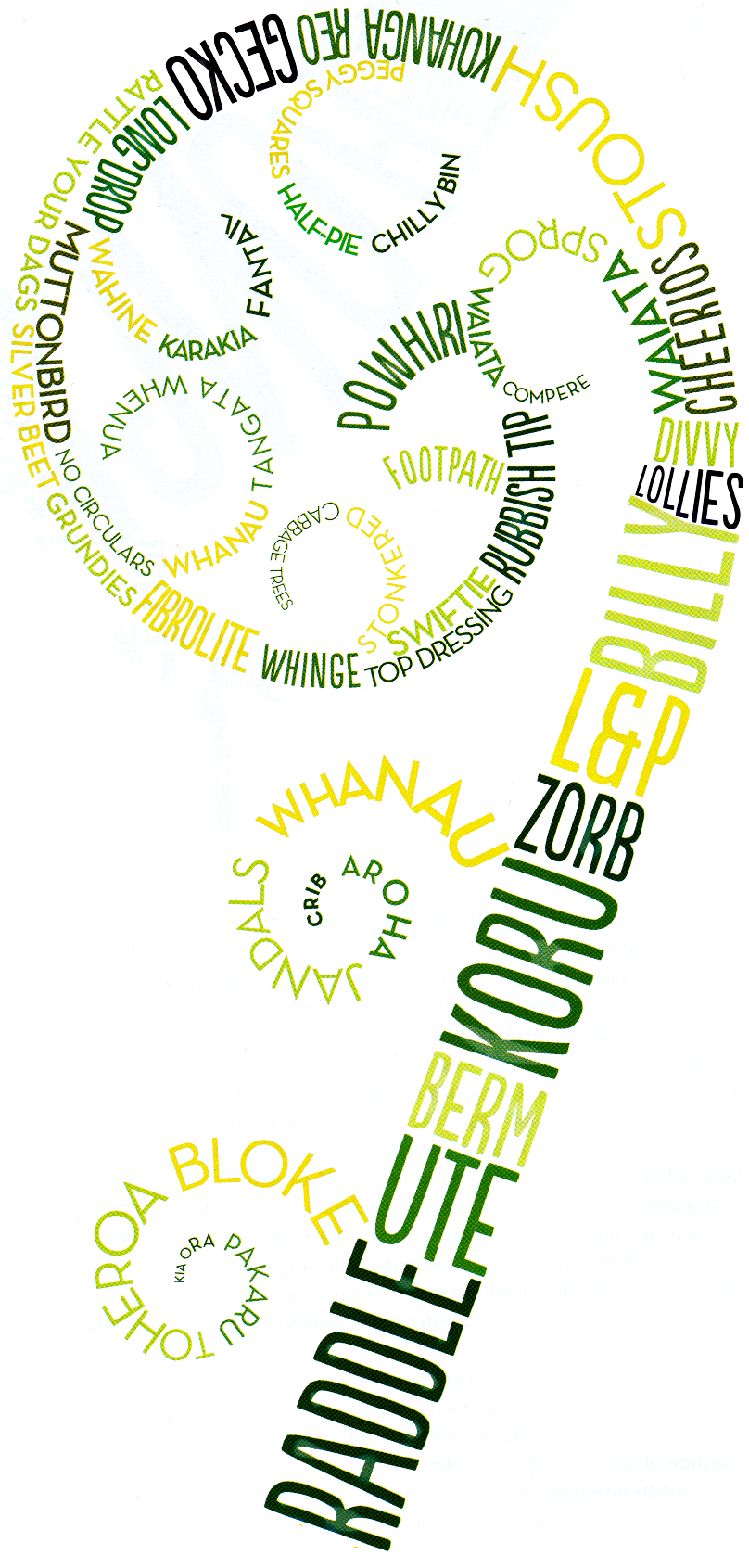 |
Description | Examples | 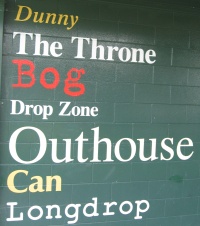 |
Nouns | Place: long drop (toilet; see pictures beside for other expressions used for this in Kiwi English) | |
| Activity: bungy jumping (jumping from a significant height while fixed by one's feet to a long cord) | |
| Kiwiana: buzzy bee (wooden children's toy in the shape of a bee fixed on wheels which can be pulled along by a string). Click here for more. | |
Verbs | squiz (to look at something) | |
| Phrasal verb: freak out (to feel very afraid) | 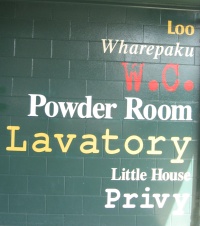 |
Adjectives | thick (not very clever) | |
Idioms | She’s away with the fairies (She’s daydreaming) | |
Shortened word forms
| Clipping: breakie (breakfast), beaut (beautiful) | |
Abbreviations: ACC (Accident Compensation Corporation). Click here for more. |
Photos taken in Otorohonga, New Zealand's so-called "Kiwiana" town
Click on the tabs above to learn more about and practise using Kiwi colloquialisms and expressions.
Reading and listening
Read the following passage which has quite a number of words and expressions that are unique to Kiwi English. You’ll see that words unique to Kiwi English have been underlined. See if you can work out their meaning from the context.
If you want to listen to the passage read by a Kiwi, click here.
When I was about sixteen I had a mate called Kev. We were in the same class together at high school. Kev hated lessons so he’d often wag school for a couple of days and bugger off into the bush to go tramping and fishing. He used to stay in a bach his family owned, right out in the wop wops. In the holidays, I’d go and stay with him and his family at the bach and it was really wicked! We’d go out fishing all day and come back and cook ourselves up a big feed on the barbie. When we left school, Kev and I went flatting together. I used to get really annoyed with him sometimes, ‘cos he never did anything around the place, so it was always me cleaning up and mowing the lawns. We had loads of mates who lived in the same area, and we’d all knock off early on a Friday night and meet up at the local pub for a few drinks. Kev was always the first to shout us a round, so I didn’t mind so much that he was lazy at home. We’d usually get the munchies on the way home from the pub and so I'd have to stop off somewhere to get some grub. (Adapted from Catt, 1998, p. 28)
Now do the exercise below to check your understanding. Drag the correct word or phrase from the words at the top to the correct meaning below.
mate
wag
bugger off
tramping
bach
wop wops
wicked
feed
went flatting
'cos
loads of mates
knock off early
shout us a round
barbie
get the munchies
grub
View the video for the "Legend" advertisement
The following advertisement was launched by the New Zealand Transport Authority in 2011 as part of a nation-wide drink-driving campaign, initiated to lower the incidence of youth drink-driving causing death and injury on New Zealand's roads. This advertisement will not only give you the opportunity to listen to colloquial Kiwi English, it will also provide the chance to listen to so-called "Māori English".
Watch the video twice. On the first viewing, see if you are familiar with the various Kiwi English expressions. On the second viewing, look at the transcript below to check whether you correctly identified the various Kiwi English expressions.

Used with permission, New Zealand Transport Authority (2011), Legend Advertisement
Click here to view the transcript
| | Main character: Friend: Main character: Family member: Main character: Ghost George: Main character: Younger boy: Older boy: Ghost George: George: Main character: George: Main character: George: Main character: Background voice: George: Background voice: | Oh no. George is driving. He’s too wasted. I should say something but I could look dumb in front of Monique. Bro, Monique says you’re dumb. But if he crashes, I’ll have to live with his family. Puzzle-time! And if he dies, Ghost George will haunt me forever. Grab a chip. Wanna a chip? You know I can’t grab your ghost chips. Go away! Spoon. Space-head! Boo! What are you? What are you doing bro? Oh I’ve been internalising a really complicated situation in my head. What are you on about? I don’t think you should drive. Nah. No you’re too drunk bro. Just crash here. Yeah just crash here. OK. Stop a mate from driving drunk. Legend! |
Expressions
Abbreviations
Quite a number of abbreviations have been incorporated into everyday Kiwi English to refer specifically to the customs and traditions of life in New Zealand. In order to be able to participate in everyday Kiwi life, it is important to be familiar with these.
Look at the abbreviations below and see how many you know. Place the computer mouse over any you're unfamiliar with.
Now check your knowledge of abbreviations by dragging and dropping the abbreviaton to the definition below:
1.
2.
3.
4.
5. The
6.
7. The
8. It is possible to pay for most goods and services within New Zealand by
9. A
10. The
11. When bars or restaurants are
12.
13.
Kiwiana
Kiwiana is the term used to refer to names of certain items and icons which represent popular Kiwi culture and form part of New Zealand's heritage. Many of these like buzzy bees and Lemon and Paeroa are peculiar to New Zealand, while others such as jandals and gumboots are found elsewhere, but are referred to by names specific to New Zealand. Quite a number of Kiwiana items refer to brand names which have existed in New Zealand for a considerable period of time like Edmonds (for baking items and a cooking book) and Watties (for tomato sauce and tinned goods). The so-called official "Kiwiana Town of New Zealand" is Otorohonga, a town not far from Hamilton. You may enjoy visiting this town where you can see attractive murals and exhibits depicting a range of Kiwiana. Click here to learn more. | 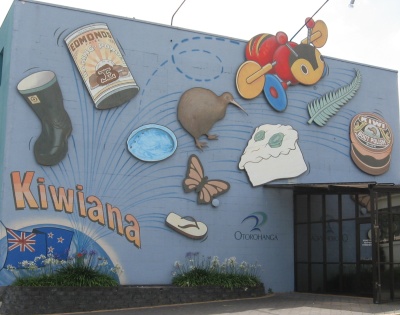 |
Look at the pictures in the table below of a few examples of so-called 'Kiwiana', and drag the appropriate word to its definition in the exercise that follows:
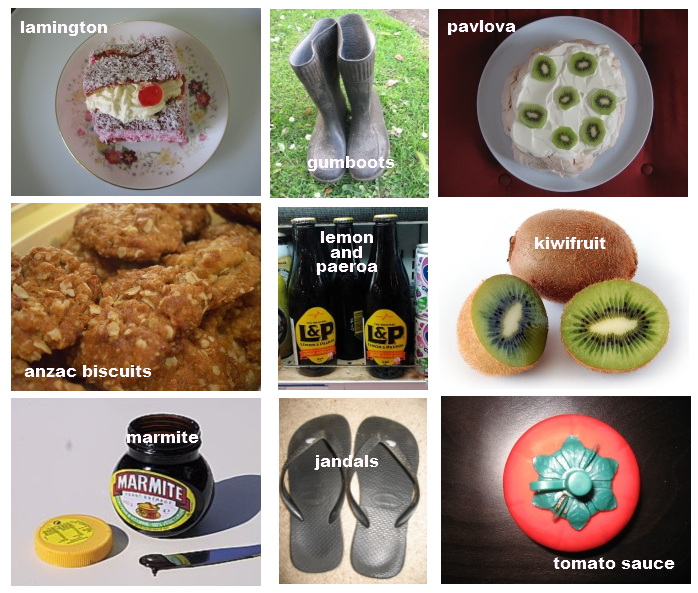
1.
2.
3.
4.
5.
6.
7.
8.
9.





